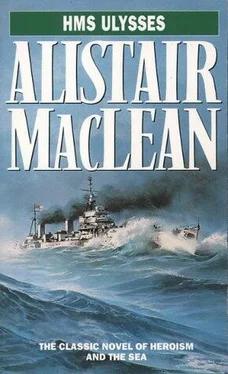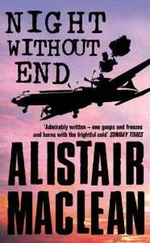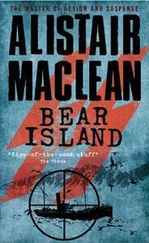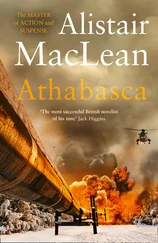"Perhaps, Cassandra, perhaps," Vallery smiled. "We'll see... What was that, Pilot? I didn't quite..."
The Kapok Kid grinned.
"It's just occurred to me that tomorrow's going to be a big day for our junior doctor-he's convinced that no battleship ever puts out to sea except for a Spithead review in peacetime."
"That reminds me," Vallery said thoughtfully. "Didn't we promise the Sirrus------?"
"Young Nicholls is up to his neck in work," Turner cut in. "Doesn't love us-the Navy rather-overmuch, but he sure loves his job. Borrowed a fire-fighting suit, and Carrington says he's already..." He broke off, looked up sharply into the thin, driving snow. "Hallo! Charlie's getting damned nosy, don't you think?"
The roar of the Condor's engines was increasing every second: the sound rose to a clamouring crescendo as the bomber roared directly overhead, barely a couple of hundred feet above the broken masts, died away to a steady drone as the plane circled round the convoy.
"W.T. to escorts!" Vallery called quickly. "Let him go, don't touch him! No starshells-nothing. He's trying to draw us out, to have us give away our position... It's not likely that the merchant ships...
Oh, God! The fools, the fools! Too late, too late!"
A merchantman in the port line had opened up-Oerlikons or Bofors, it was difficult to say. They were firing blind, completely blind: and in a high wind, snow and darkness, the chance of locating a plane by sound alone was impossibly remote.
The firing did not last long-ten, fifteen seconds at the outside. But long enough-and the damage was done. Charlie had pulled off, and straining apprehensive ears caught the sudden deepening of the note of the engines as the boosters were cut in for maximum climb.
"What do you make of it, sir?" Turner asked abruptly.
"Trouble." Vallery was quiet but certain. "This has never happened before-and it's not psychological warfare, as you call it, Commander: he doesn't even rob us of our sleep, not when we're this close to the North Cape. And he can't hope to trail us long: a couple of quick course alterations and, ah!" He breathed softly. "What did I tell you, Commander?"
With a suddenness that blocked thought, with a dazzling glare that struck whitely, cruelly at singeing eyeballs, night was transformed into day. High above the Ulysses a flare had burst into intense life, a flare which tore apart the falling snow like filmy, transparent gauze.
Swinging wildly under its parachute with the gusting of the wind, the flare was drifting slowly seawards, towards a sea no longer invisible but suddenly black as night, towards a sea where every ship, in its glistening sheath of ice and snow, was silhouetted in dazzling whiteness against the inky backdrop of sea and sky.
"Get that flare!" Turner was barking into the transmitter. "All Oerlikons, all pom-poms, get that flare!" He replaced the transmitter.
"Might as well throw empty beer bottles at it with the old girl rolling like this," he muttered. "Lord, gives you a funny feeling, this!"
"I know," the Kapok Kid supplied. "Like one of these dreams where you're walking down a busy street and you suddenly realise that all you're wearing is a wrist-watch. 'Naked and defenceless,' is the accepted term, I believe. For the non-literary, 'caught with the pants down.'" Absently he brushed the snow off the quilted kapok, exposing the embroidered "J "on the breast pocket, while his apprehensive eyes probed into the circle of darkness outside the pool of light. "I don't like this at all," he complained.
"Neither do I." Vallery was unhappy. "And I don't like Charlie's sudden disappearance either."
"He hasn't disappeared," Turner said grimly. "Listen!" They listened, ears straining intently, caught the intermittent, distant thunder of the heavy engines. "He's 'way astern of us, closing."
Less than a minute later the Condor roared overhead again, higher this time, lost in the clouds. Again he released a flare, higher, much higher than the last, and this time squarely over the heart of the convoy.
Again the roar of the engines died to a distant murmur, again the desynchronised clamour strengthened as the Condor overtook the convoy a second time. Glimpsed only momentarily in the inverted valleys between the scudding clouds, it flew wide, this time, far out on the port hand, riding clear above the pitiless glare of the sinking flares. And, as it thundered by, flares exploded into blazing life, four of them, just below cloud level, at four-second intervals. The northern horizon was alive with light, glowing and pulsating with a fierce flame that threw every tiny detail into the starkest relief. And to the south there was only the blackness: the rim of the pool of light stopped abruptly just beyond the starboard line of ships.
It was Turner who first appreciated the significance, the implications of this. Realisation struck at him with the galvanic effect of sheer physical shock. He gave a hoarse cry, fairly flung himself at the broadcast transmitter: there was no time to await permission.
"'B' turret!" he roared. "Starshells to the south. Green 90, green 90. Urgent! Urgent! Starshells, green 90. Maximum elevation 10. Close settings. Fire when you are ready!" He looked quickly over his shoulder.
"Pilot! Can you "'B' turret training, sir."
"Good, good!" He lifted the transmitter again. "All guns! All guns!
Stand by to repel air attack from starboard. Probable bearing green 90.
Hostiles probably torpedo-bombers." Even as he spoke, he caught sight of the intermittent flashing of the fighting lights on the lower yardarm:
Vallery was sending out an emergency signal to the convoy.
"You're right, Commander," Vallery whispered. In the gaunt pallor, in the skin taut stretched across the sharp and fleshless bones, his face, in that blinding glare, was a ghastly travesty of humanity; it was a death's-head, redeemed only by the glow of the deep-sunken eyes, the sudden flicker of bloodless lids as the whip-lash crash of 'B' turret shattered the silence. "You must be," he went on slowly. "Every ship silhouetted from the north-and a maximum run-in from the south under cover of darkness." He broke off suddenly as the shells exploded in great overlapping globules of light, two miles to the south. "You are right," he said gently. "Here they come."
H.U. 225 H They came from the south, wing-tip to wing-tip, flying in three waves with four or five planes in each wave. They were coming in at about 500 feet, and even as the shells burst their noses were already dipping into the plane of the shallow attack dive of the torpedo-bomber. And as they dived, the bombers fanned out, as if in search of individual targets-or what seemed, at first sight, to be individual targets. But within seconds it became obvious that they were concentrating on two ships and two ships alone-the Stirling and the Ulysses. Even the ideal double target of the crippled merchantman and the destroyer Sirrus, almost stopped alongside her, was strictly ignored. They were flying under orders.
'B' turret pumped out two more starshells at minimum settings, reloaded with H.E. By this time, every gun in the convoy had opened up, the barrage was intense: the torpedo-bombers-curiously difficult to identify, but looking like Heinkels-had to fly through a concentrated lethal curtain of steel and high explosive. The element of surprise was gone: the starshells of the Ulysses had gained a priceless twenty seconds.
Five bombers were coming at the Ulysses now, fanned out to disperse fire, but arrowing in on a central point. They were levelling off, running in on firing tracks almost at wave-top height, when one of them straightened up a fraction too late, brushed lightly against a cresting wave-top, glanced harmlessly off, then catapulted crazily from wave-top to wave-top-they were flying at right angles to the set of the sea-before disappearing in a trough. Misjudgment of distance or the pilot's windscreen suddenly obscured by a flurry of snow-it was impossible to say.
Читать дальше
Конец ознакомительного отрывка
Купить книгу












